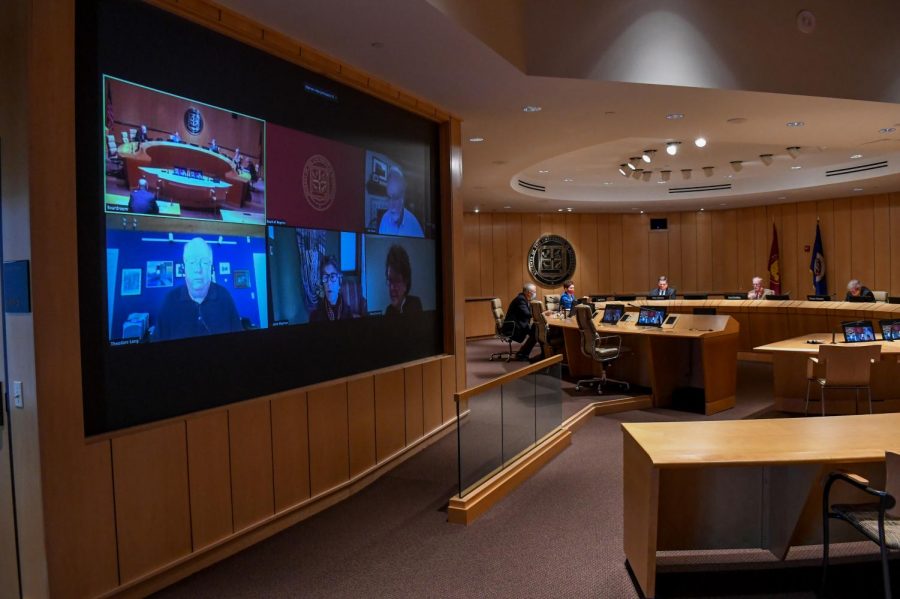The University of Minnesota Board of Regents approved the purchase of up to 66,000 COVID-19 testing kits, and a contract extension with Aramark Corporation in meetings held Oct. 8 and 9.
The board also approved the capital budget request and the elimination of three men’s sports — a conversation that has prompted several student protests. The board also discussed the delay of spring break.
Board members and administrators gathered both in person and virtually to conduct the meeting.
COVID-19 testing kits
Following unanimous approval from the Finance and Operations Committee, the University now has the ability to purchase up to 66,000 additional COVID-19 testing kits. The University will purchase the kits from Vault Health for approximately $8.5 million, as part of the MTest program.
This supplemental testing program will not require students to pay out of pocket.
“Cost will be covered by individual student health insurance or by the University,” said Senior Vice President for Finance and Operations Myron Frans at the meeting.
Each student will receive one individual saliva testing kit they can use and mail in at their discretion. These additional testing capabilities are an effort to include the University in similar plans currently available to staff and faculty as well as K-12 students around the state, President Joan Gabel said.
Aramark contract extension
After several months of deliberation, regents also approved a contract extension with Aramark, the food service provider for the University.
The University’s original contract with Aramark ended in June and included an option to extend the contract for an additional two years. The regents voted to add a third year to this extension period, intended to give administrators time to consider other dining options for the future.
Student groups, such as the Minnesota Student Association, have raised concerns over the past several years about Aramark’s ability to comply with dietary restrictions and cultural practices, among other issues. This prompted the board’s conversations about changing vendors or moving to a self-operated system.
“This is not a timeline or delay that we are thrilled about,” said Vice President of University Services Mike Berthelsen at the meeting. “We certainly know the campus at large, especially the student leadership and student body has been anxious to do a full review of this program.”
University finances
The Finance and Operations Committee reviewed and voted on several items regarding University finances, including Gabel’s Capital Budget Request and Six-Year Capital Improvement Plan.
The six-year plan is updated each year to reflect the University’s top financial priorities and also includes the president’s annual request for funding from the Minnesota State Legislature. For 2021, the capital request totals more than $380 million, with $51 million coming from the University and the remaining $329 million coming from the state.
This will fund several projects around the University, including advancing the health sciences and capacity in STEM programs and modernizing laboratories on the Twin Cities campus.
”The University has critical facility needs. As time passes and bonding bills aren’t passed, these needs become more urgent,” Bethelsen said.
In fiscal year 2020, the University experienced approximately $64 million in budget shortfalls, 71% of which was covered by existing funds and reserves.
Spring break delay
The board also discussed the decision to delay spring break until April 5-9 at the meeting, following approval of the proposal by the Faculty Senate on Oct. 5.
Pushing spring break back gives the University the flexibility to evaluate public health recommendations and make decisions regarding course modality, Gabel said.
The dates of spring break differ slightly from campus to campus. The Twin Cities and Rochester campus favored maintaining a five day break from classes, while others created a semester schedule with intermittent days off instead.
Evan Berg contributed to this report.













